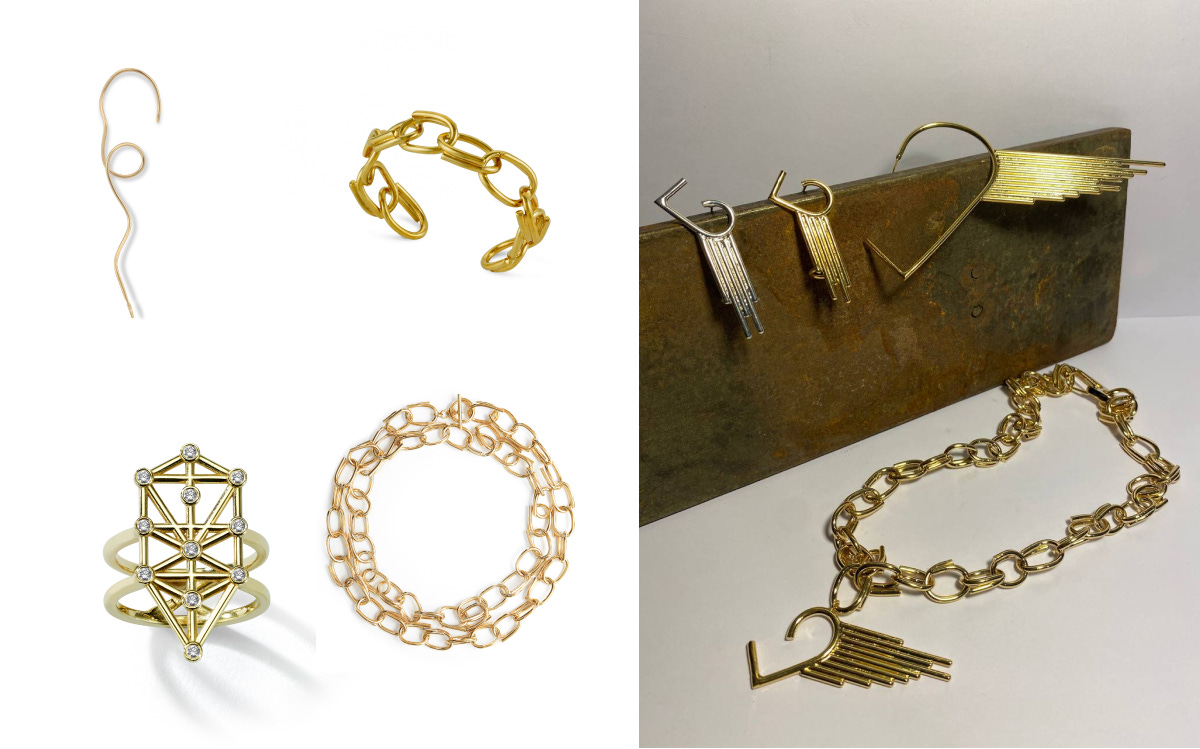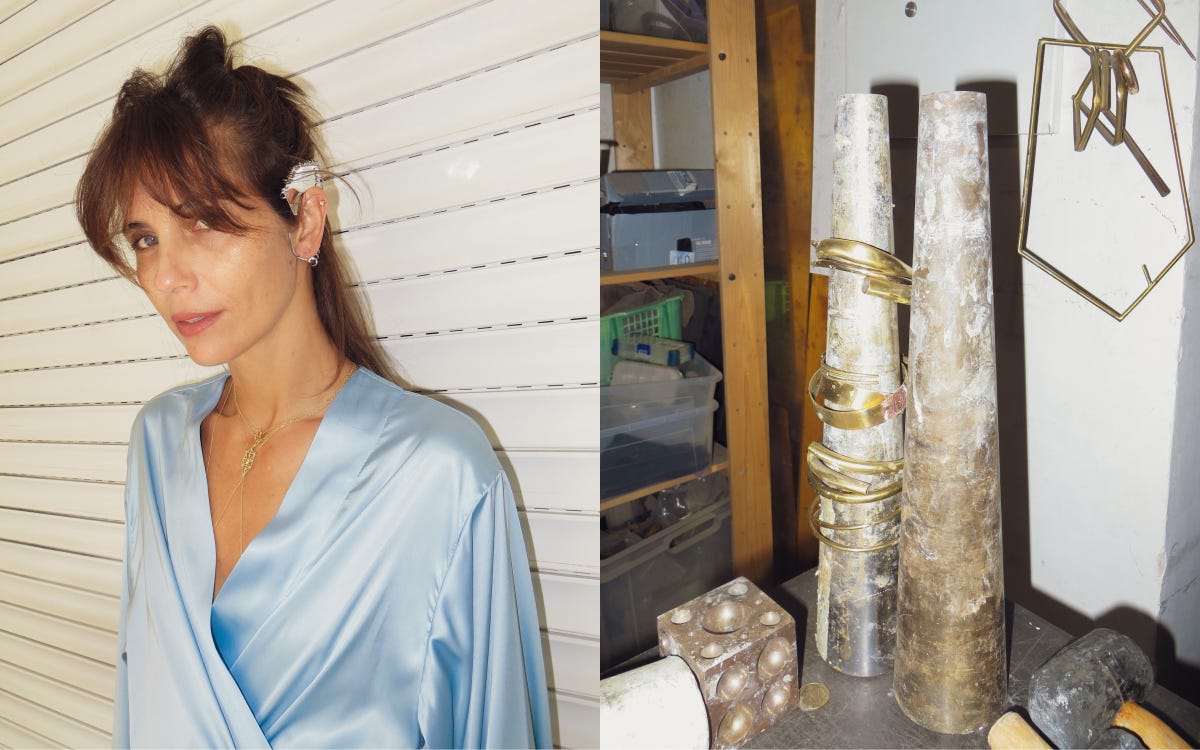Noritamy: living and creating jewelry in Tel Aviv
Jewelry designer Elinor Avni on designing what you believe in, collaborations, and Gaga classes
When Nino Shamatava, a co-founder of USHATÁVA (my friends’ great Russian brand) came to Tel Aviv and told me that she was going to visit an amazing jewelry designer, of course I had to come with her. That’s how I met Elinor Avni, the founder of Noritamy. I immediately loved her approach – the jewelry looked simple yet sophisticated: thought-through, easy to wear, minimalistic yet demanding of attention. The pieces possessed a sense of movement: a heart with lines as if it were in flight; earrings reminiscent of a flourish; twisted hoops; signature chains with open links. There were affordable pieces along with fine jewelry, and all had a touch and feel of the designer. “I like to give my clients something that I would like to wear,” said Elinor, the beautiful Noritamy founder, with an endearing yet mysterious, Mona Lisa-esque smile. “This is the benchmark. If I don't want to wear it, I will never manufacture it.”
And she does a lot. I see her at the exhibition in Holon showcasing designers’ and artists’ reflections on and interpretations of a black garbage bag (some of Elinor's artistic experiments include huge chains made of black plastic bags). She flits from her studio in North Tel Aviv to Gaga classes in Neve Tzedek, a beautiful artistic neighborhood of Tel Aviv. She pairs an USHATÁVA jacket with her own designs for the Israeli brand Razili with ease, and she has this natural influencer vibe – when you see her, you want to have whatever she is having. “In everything I do, I try to bring my personal approach and my style,” she says: “Otherwise I'm not interested in doing it.”
How did Noritamy start?
It was something that we launched together, my mother and I. I was in interior design, that's my degree. I had my own studio in Tel Aviv with a friend and partner at the studio – we've been running it for nine years. But then, my mother started taking these jewelry courses, and she ended up studying for almost four years. She would come home with unfinished pieces of jewelry. At one point, we started to make pieces together, and I suggested that we should try to sell some of them. We did a friends and family event, and it was very, very good.
I think it was Karen Oberzon, an Israeli fashion designer, who took some pieces for a fashion show. She was working with her dad, Gideon Oberzon, who is a very famous Israeli couture designer. And from there it was exposed to the public. Pretty soon after that, we began to do shows in Paris, London and Milan – took Noritamy overseas.
This was back in 2007?
Yeah.
How did you know people in the fashion crowd back then?
I actually didn't. I have this thing where I’m always happy to meet new people. I knew no one in the fashion industry when I started, because I was in another industry - which is similar, but not the same crowd: the interior designers and architects. But I got to know people, and I think I know most of the fashion industry here by now.
How old were you then?
I was 31, pregnant with my middle child. That's when I decided that, maybe, I had had enough of interior design – although I still love it, and I still get inspiration from it.
How did you build production?
Coming from interior design, I love materials, and we try to explore different kinds of them. We were working with brass, metals, gold, and silver, but also with wood and polymers, and one of the first collections was made from concrete. We really try to explore and experiment. For some pieces, I would find objects that I love for their shape and recreate them in a different scale and material. The inspiration really comes from my past experiences and from day to day things or objects that I collect when I travel. The jewelry world is not my inspiration for making jewelry.
Could you describe your team right now? How many people are there?
I have several projects. Noritamy is me and two employees at the studio. One is in charge of production, and the other is in charge of managing the studio. Most of the pieces are handmade in our studio. But we have a gold and diamond collection called Hidden Sparks, it’s a collaboration with Anna Cohen, a life coach and an author – and the whole collection is about spirituality. For that, we have factories working with us. I also consult and design for other companies.
Can you tell me about Razili and how you started with clothes?
Razili is a chain in Israel focusing on Israeli designers and collaborating with them. My line started during Covid. We were all home, doing a lot of sports, and I was so sick of my sporting gear, because everything was neon, black, or gray. And I had this idea of, you know, gear for when I want to have coffee with friends. I wanted to be very stylish. And so that was my first collection for them, a very versatile collection that you can wear all day. After that we continued. It's super fun because it’s an embodiment of the things that I would like to wear, which are really between night and day, and they're seasonless.
You collaborate a lot with creators from within your industry.
I think in the past few years, it has become more typical to collaborate. I personally think it's amazing. I've always loved to collaborate: I love a process even more than the outcome. I don't really care if we launch it or not. The process is amazing. It's very fertilizing, you know. Very inspiring.
What do you usually wear besides your own line?
Most of my purchases are online. I hardly go to stores because I don't have time. There are many Israeli designers that I wear: Holy Land Civilians, Roni Bar, Ata.
Anyone from abroad that you especially like?
I love Isabel Marant, she's my favorite. Y-3 by Yohji Yamamoto. USHATÁVA.
What does your usual week look like?
It's very versatile. Two days a week I’m at Oak and Luna, a jewelry company where I’m head of design. Then there’s my own studio – sometimes I have meetings there, or I'm just designing. Sometimes I go around a lot, to meetings, to suppliers. And on top of that I have my beautiful family of three kids and a dog. I take Gaga classes - I try to go at least two times a week - and I also play catchy ball (it's like volleyball). So that's another two or three times a week in the evening. And in the middle are friends and all the rest.
Can you tell me about Gaga? It's a very Tel Avivian thing.
Since Covid, it became very international, because they have it online now and it's grown insanely. Gaga is a movement language created by [choreographer] Ohad Naharin over 20 years ago. I was in a car accident, and, in order to heal what happened to me, I started Gaga, and it healed me – my body, my mind, my soul. It’s basically an exploration of movement, and it’s interesting because it's so different from class to class. You have a teacher that shows you or tells you what we're exploring now, and then you take it to yourself. It's something that I think you can't understand until you try it. It's addictive.
What are your clients like?
I have quite a range of clients. Young, older. People that are very much in touch with their artistic side. A lot of architects and designers. Women that tell me “I've never worn jewelry until I met Noritamy.” Or women that just used to wear only classic diamonds. I know that Noritamy is niche, but, within that niche, it's very varied.
I have clients that have kept coming back for 15-16 years, which is insane. I feel like they trust us, they trust that we know what we're doing, both in terms of quality and in terms of creating something not just for the sake of selling. I try to create pieces that I believe in, and, when you believe in something, then people follow you. I would never, ever tell a client that a piece looks good on her if I don't think it looks good on her.
5 short questions to Elinor Avni:
– Where to eat in Tel Aviv?
– שפוי on Carmel market.
– What's your favorite secret spot in Tel Aviv?
– The beach is always my go-to place when I have to think, to relax, to breathe. Usually the beach across Suzanne Dellal Centre.
– What advice would you give yourself 20 years ago?
– Don’t compete with anyone but yourself.
– Your bestseller?
– Some classic pieces like earrings that keep selling, over and over, for years and years.
– Favorite month in Tel Aviv?
– October, November: when it's after the holidays and getting a bit chilly.









omg what a woman! and I absolutely love the winged hearts!